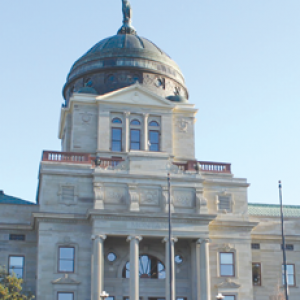By Nicole Rolf and Rachel Cone, Montana Farm Bureau Federation
As we review the official first half of the Montana Legislative session, it’s safe to say the session is looking good for Montana agriculture. Of the 3,357 total bill draft requests, 1,121 have been formally introduced. Montana Farm Bureau has taken a stance and lobbied for or against 60 of those, based on the policy directives of our farming and ranching members. Many of the bills we have supported are already on their way to the Governor’s desk. There are no bills left alive from the first half that we have opposed, unless they have been amended in a way that either no longer makes them harmful or, in some cases, even makes them policy we could now support.
We return to Helena this week after a restorative transmittal break. This is the session’s ‘half time.’ Montana is a citizen legislature, which means many of our Representatives and Senators go home to tend to businesses, families and their communities during the transmittal break. With only 90 days every other year to do the legislative work of the people, legislators, lobbyists and legislative staff and volunteers put in long days to get the work done. We commend each of our elected officials for their commitment to this work and the time they dedicate away from their homes and families to make the process work.
While most of our efforts focus on bills intended to direct state policy or law, we also spent some of our time in the last week before transmittal break testifying in support of a number of resolutions. Resolutions are intended to send a message to Congress or the President to show the intent of a state’s elected body. Sometimes, we call these “Letters to Santa” with a laugh; but sometimes, Santa listens and responds to the requests. In fact, we’ve been told by Congressional staffers that these resolutions are quite helpful and directive.
Senate Joint Resolution 18: Resolution on state management of grizzly bears, sponsored by Sen. Bruce Gillespie (R), SD 9. Montana Farm Bureau Federation member policy supports.
This resolution expresses Montana’s desire and ability return management of the grizzly bear populations in our state to our state. Montana has established a strong, effective track record in managing grizzly bears and other species such as wolves, and developed an approved management plan for the Yellowstone distinct population segment that provides for the continued presence and genetic future of grizzly bears on the landscape. Our wildlife managers are much closer to the ground and understand the complexities and realities of our grizzly bear population far better than federal managers in Washington, DC, and it’s past time that responsibility was returned to Montanans.
Senate Joint Resolution 7: Resolution to remove Hidden Pasture Creek from Wilderness Study Area, sponsored by Rep. Jeffrey Welborn (R), SD 36. Montana Farm Bureau Federation member policy supports.
In 1993, the Bureau of Land Management recommended that Congress exclude the Hidden Pasture Creek Wilderness Study Area located west of Dell, Montana, from the wilderness system. However, more than 15,000 acres of this area has continued to be managed as de facto wilderness as a result of inaction to release the land from a WSA. The southern boundary of the ‘Wilderness Study Area’ is a county road that has historically been and remains today, the principle transportation route for those living and using the Big Sheep Basin for ranching and recreation and the business of the Bureau of Land Management, US Forest Service and Department of Natural Resources and Conservation.
Leaving this area a de factor wilderness through its classification as a Wilderness Study Area makes it difficult if not impossible for many residents of Southwest Montana to conduct business in the area, and there is no doubt it should be released back to the intended multiple-use management of the BLM.
Senate Joint Resolution 16: Urge support for Keystone XL Pipeline, sponsored by Sen. Steve Hinebauch (R), SD 18. Montana Farm Bureau Federation member policy supports.
Montana Farm Bureau members support the completion of the Keystone XL Pipeline for three primary reasons: first, its completion will significantly increase the tax base of our rural communities; second, it creates jobs in our rural communities and finally, it provides stimulus to our local economies.
House Joint Resolution 7: Joint resolution regarding the St. Mary and Milk River project, sponsored by Rep. Casey Knudsen (R) HD 33. Montana Farm Bureau Federation member policy supports.
This resolution urges Congress, the Department of the Interior and the Bureau of Reclamation to repair the funding allocation and authorize funding for the replacement and rehabilitation of the Projects. This infrastructure was built in 1903 and provides water for irrigation, consumption, recreation and tribal use across north-central Montana. The Milk River Project provides drinking water for more than 19,000 people along the Hi-Line and supplies irrigation water to more than 700 farms with the capacity to feed 1 million people annually. When the Drop 5 structure of the Milk River Project in north-central Montana failed in May 2020, project beneficiaries paid 48% of the cost to replace the Drop 2 and Drop 5 structures and improve the Drop 1 structure. The total cost of rehabilitation is estimated to cost more than $200 million, with requirements that project beneficiaries (irrigators) pay for 74% of those costs. This is not a reasonable or sustainable cost for irrigators to carry. This resolution asks for the Department of the Interior and Bureau of Reclamation to assist in the rehabilitation and replacement of the structures and to reconsider the funding methods to make modernizing this structure sustainable for all water users.

